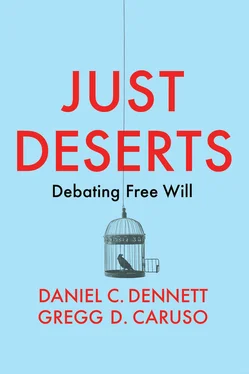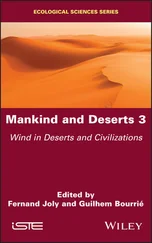Daniel C. Dennett - Just Deserts
Здесь есть возможность читать онлайн «Daniel C. Dennett - Just Deserts» — ознакомительный отрывок электронной книги совершенно бесплатно, а после прочтения отрывка купить полную версию. В некоторых случаях можно слушать аудио, скачать через торрент в формате fb2 и присутствует краткое содержание. Жанр: unrecognised, на английском языке. Описание произведения, (предисловие) а так же отзывы посетителей доступны на портале библиотеки ЛибКат.
- Название:Just Deserts
- Автор:
- Жанр:
- Год:неизвестен
- ISBN:нет данных
- Рейтинг книги:3 / 5. Голосов: 1
-
Избранное:Добавить в избранное
- Отзывы:
-
Ваша оценка:
- 60
- 1
- 2
- 3
- 4
- 5
Just Deserts: краткое содержание, описание и аннотация
Предлагаем к чтению аннотацию, описание, краткое содержание или предисловие (зависит от того, что написал сам автор книги «Just Deserts»). Если вы не нашли необходимую информацию о книге — напишите в комментариях, мы постараемся отыскать её.
Just Deserts
truly deserving
Just Deserts
Just Deserts — читать онлайн ознакомительный отрывок
Ниже представлен текст книги, разбитый по страницам. Система сохранения места последней прочитанной страницы, позволяет с удобством читать онлайн бесплатно книгу «Just Deserts», без необходимости каждый раз заново искать на чём Вы остановились. Поставьте закладку, и сможете в любой момент перейти на страницу, на которой закончили чтение.
Интервал:
Закладка:
Dennett:You’ve given an admirably clear summary of the standard definition of determinism, Gregg, and your two closing questions make exactly the right distinction, so let me answer them. Yes, I accept that “if determinism is true, then all human behavior, like the behavior of all other things in the physical universe, is causally determined by antecedent conditions in accordance with natural laws.” (And I have no quarrel with determinism; I see no reason at all to hope that human behavior is undetermined by those antecedent conditions.) But I do not accept your second claim, that determinism rules out or excludes an agent’s ability to do otherwise. You add: “in the unconditional sense” and this clause, as I’ve argued for decades, is a huge mistake – and I’ll say more about it in our debate. If what you are interested in is the ability of anything to do anything, you are never interested in what it does “in exactly the same circumstances.” I’ll try to make that clear as we go along. Let me add that I think your account of how “some compatibilists” interpret “could have done otherwise” in terms of certain conditionals about desires is accurate, but it shows that they, too, miss a key point. If you stick to these (quite standard but nevertheless misguided) readings of “could have done otherwise,” then not only is free will an illusion, as you would claim, but so is life; nothing is really alive. I consider that a reductio ad absurdum , but tastes may vary.
Caruso:Thank you, Dan, for your direct and candid answers. They provide us with a good starting point. It seems we generally agree on the implications of determinism for human action, you just deny that the ability to do otherwise should be understood in terms of the “ability to do otherwise in exactly the same circumstances .” (I assume you agree, though, that if determinism is true, we lack such an ability?) I’ll give you an opportunity to explain your position further, but you may be surprised to learn that my primary reasons for rejecting compatibilism do not depend on the ability to do otherwise or presuppose that it is a necessary condition for free will. In fact, my main arguments against compatibilism focus on the causal history of an agent’s actions and not on alternative possibilities. In our next exchange, I hope to spell out and discuss two of these arguments in detail, the manipulation argument and the hard luck argument . For the moment, though, I’ll provide a few rough reasons for thinking that determinism is a threat to free will and (desert-based) moral responsibility.
First, consider the following argument for incompatibilism, which is independent of considerations regarding alternative possibilities and the ability to do otherwise. It comes from the American philosopher Peter van Inwagen, Professor of Philosophy at the University of Notre Dame. As he puts it:
If determinism is true, then there is some state of the world in the distant past P that is connected by the laws of nature to any action A that one performs in the present. But since no one is responsible for the state of the world P in the distant past, and no one is responsible for the laws of nature that lead from P to A, it follows that no one is responsible for any action A that is performed in the present. (van Inwagen 1993: 182–183)
This argument captures one of the incompatibilist intuitions I have regarding determinism (see also Pereboom 2001: 34). The problem, I contend, is that if determinism is true, then there are conditions for which no one is, or ever has been, even partly responsible (in the sense relevant to free will), and these conditions determine the actual sequence that brings about the agent’s action. This is why I endorse, along with my friend and fellow skeptic Derk Pereboom, the following incompatibilist intuition about determinism: “An action is free in the sense required for moral responsibility only if it is not produced by a deterministic process that traces back to causal factors beyond the agent’s control” (Pereboom 2001: 34).
Second, so-called folk intuitions about free will indicate that ordinary people (or the “folk” as philosophers like to call them) think that their choices aren’t determined. As the experimental philosopher Shaun Nichols explains: “It is not just that they don’t have the belief that their choices are determined. Rather, they positively think that their choices are not determined. And this belief is implicated in their thoughts about free will” (2012: 203). For instance, when presented with a description of a deterministic universe, most participants say that in that universe, people don’t have free will (see, e.g., Nichols and Knobe 2007). More specifically, in one classic study, participants were given descriptions of a deterministic universe (A) and another universe (B) in which everything is determined except human choices. Participants were asked, “Which of these universes is most like ours?” More than 90 percent of the respondents said that universe (B) – the indeterministic universe – is most like our own (Nichols and Knobe 2007: 669). Additional empirical findings indicate that, not only do people tend to believe that they possess indeterminist free will, people’s experience of choosing and deciding is that they possess such indeterminist (or libertarian) freedom (see Deery et al. 2013). And, even when people seem to express compatibilist intuitions, there’s evidence that this is largely explained by the fact that people import an indeterministic metaphysics into the deterministic scenarios they are given when making judgments about free will and moral responsibility (see Nadelhoffer et al. 2019). There is converging evidence, then, that ordinary thinking is at least partly or largely indeterminist. *This provides reason to think that the everyday conception of free will is not compatible with determinism (or at least that people’s intuitions are unclear and confused). So, even if every-day folk tend to think that our ordinary desert practices are justified, this may be because they falsely presuppose that indeterminism is true.
Given these empirical findings, I have four questions for you. First, how do you explain the widespread folk tendency to believe in indeterminist free will? Second, why think your compatibilist conception of free will is the one the folk care about? Third, if it’s not the one the folk care about, why should we think that it’s the only sense that matters to the free will debate? And lastly, are you at least willing to admit that your account is a revisionist one, i.e. it seeks to defend a notion of free will that is different than the one ordinary people believe in?
I have other concerns regarding determinism as well, but perhaps I should pause here and let you respond.
Dennett:I’ll briefly answer your four questions, leaving the details for later in the debate. First, the widespread folk tendency to believe in indeterminist free will is due to misunderstanding. I will point out the mistakes of imagination that have led us to this curious state. For instance, determinism does not prevent you from making choices, from turning over a new leaf, from becoming less impulsive, from rethinking decisions, from learning from your mistakes, from resolving to do better and succeeding – or from taking advice on how to think about free will! If that’s news to you, you have been mis-imagining determinism and you have lots of company. Second, I think my compatibilist conception of free will is the one the folk care about because it is not inflated. When people think something is really important – and free will is really important – they tend to exaggerate their account of what it is or must be; they don’t just want powers, they want superpowers, or so they think. Third, the reason I think my conception of free will is the only kind of free will worth wanting is that I’ve been asking very smart people for decades if they can tell me why anybody should care about any concept of free will other than mine, and nobody yet has come up with a good answer. Why, for instance, would anyone want the ability to make “contra-causal” or strictly undetermined decisions? I can readily imagine good reasons for wanting to be able to fly by flapping one’s arms, or the ability to travel to another galaxy, or to time-travel – what a trip that would be! – or, getting closer to home, the ability to undo a deed one regretted, but the attractions of indeterminism of choice have yet to be defended – I’ll discuss later an apparent defense that proves (to me) that the quest is superstitious at best. Mostly people just assume that an inflated concept of free will is the only one worth thinking about – “Accept no substitutes! Look out for Dennett’s bait-and-switch move!” Fourth, I am not just willing but eager to “admit” that my account is a revisionist one, that seeks to defend a notion of free will that is different than the one ordinary people believe in. One of the besetting foibles of much contemporary philosophy is its regressive reliance on everyday “intuitions” as the touchstones of truth.
Читать дальшеИнтервал:
Закладка:
Похожие книги на «Just Deserts»
Представляем Вашему вниманию похожие книги на «Just Deserts» списком для выбора. Мы отобрали схожую по названию и смыслу литературу в надежде предоставить читателям больше вариантов отыскать новые, интересные, ещё непрочитанные произведения.
Обсуждение, отзывы о книге «Just Deserts» и просто собственные мнения читателей. Оставьте ваши комментарии, напишите, что Вы думаете о произведении, его смысле или главных героях. Укажите что конкретно понравилось, а что нет, и почему Вы так считаете.












